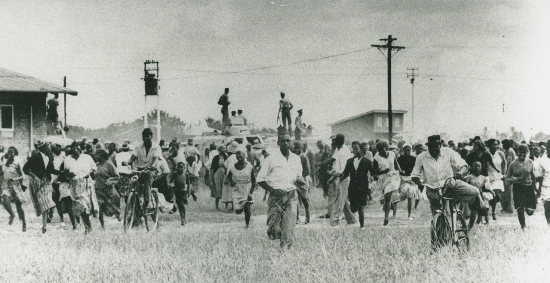|
21 March 2010
Human rights and history: SAHA reflects on the Sharpeville Massacre and how it changed South Africa
On March 21, 1960, Sharpeville became the focus of an international outcry against the evils of apartheid when 69 peaceful demonstrators were shot by police. Under Robert Sobukwe, the PAC advocated a strategy of mass action, including boycotts, strikes, peaceful demonstrations and civil disobedience. To launch this campaign, Sobukwe called on all African men and women to join the anti-pass campaign by leaving their passes at home to join countrywide peaceful demonstrations in police stations.
"The African people have entrusted their whole future to us...and we have sworn that we are leading them, not to death, but to life abundant... in this campaign we are going to observe absolute non-violence...if the other side so desires, we will provide them with an opportunity to demonstrate to the world how brutal they can be."
March 21 started off peacefully, as a large gathering waited outside the local police station. The police were nervous after reports of a mob killing of 9 police officers in Cato Manor two months before. 69 out of 300 protesters were killed when police shot into the unarmed crowd. Hundreds were injured, many shot in the back while attempting to flee. The death toll included 8 women and 10 children. Within days, a State of Emergency was declared. In early April both the PAC and ANC were declared illegal. Forced underground, both organisations initiated an armed struggle which would continue for over 3 decades.
International condemnation of the Sharpeville Massacre was unanimous. The United Nations General Assembly proclaimed March 21 as the International Day for the Elimination of Racial Discrimination in 1966. Thirty years later, Nelson Mandela inaugurated South Africa's new democratic Constitution at the site of the massacre. In 2001, a plaque bearing the 69 names was unveiled. March 21 is also known as Heroes Day. SAHA salutes the memory of all South Africans who experienced violence, lost loved ones, or perished in the name of human rights. We also salute organisations set up to help survivors cope with the trauma suffered in the name of human rights, particularly the Khulumani Support Group.
Click here to view SAHA's publication, Katorus Stories, written in collaboration with the East Rand Khulumani Support Group.

Anti-pass campaign demonstrators flee as police shoot into the unarmed crowd gathered outside the Sharpeville Police Station. (Original SAHA Photograph Collection :: AL2547_24.3.3) |








